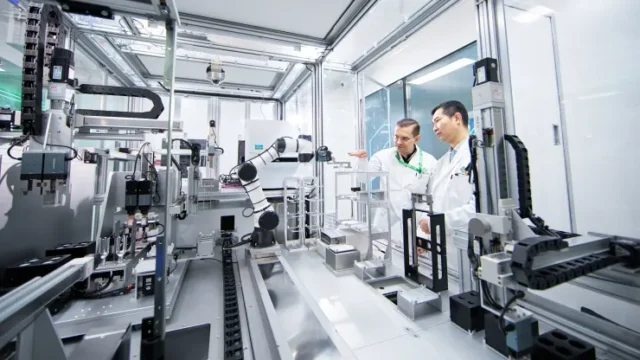
By Hayden Field
The first drug fully generated by artificial intelligence entered clinical trials with human patients this week.
Insilico Medicine, a Hong Kong-based biotech startup with more than $400 million in funding, created the drug, INS018_055, as a treatment for idiopathic pulmonary fibrosis, a chronic disease that causes scarring in the lungs.
The condition, which has increased in prevalence in recent decades, currently affects about 100,000 people in the U.S. and can lead to death within two to five years if untreated, according to the National Institutes of Health.
The discovery process for the new drug began in 2020, with hopes to create a “moonshot” medicine to overcome challenges with current treatments for the condition, which mostly focus on slowing progression and can cause uncomfortable side effects, Zhavoronkov said.
He added that Insilico has chosen to focus on IPF in part because of the condition’s implications in aging, but the company has two other drugs partially generated by AI in the clinical stage. One is a Covid-19 drug in phase one clinical trials, and the other is a cancer drug, specifically a “USP1 inhibitor for the treatment of solid tumors,” that recently received FDA approval to initiate clinical trials.
“When this company was launched, we were focused on algorithms — developing the technology that could discover and design new molecules,” Zhavoronkov said. “I never imagined in those early days that I would be taking my own AI drugs into clinical trials with patients. But we realized that in order to validate our AI platform, we needed to not only design a new drug for a new target but bring it into clinical trials to prove that our technology worked.”
The IPF drug’s current study is a randomized, double-blind, placebo-controlled trial taking place over 12 weeks in China, and Insilico has plans to expand the testing population to 60 subjects at 40 sites in the U.S. and China. If the current phase two study is successful, it will go on to another study with a larger cohort, and then potentially reach phase three studies with hundreds of participants.
“We expect to have results from the current Phase II trial next year,” Zhavoronkov said, adding that it’s difficult to predict the exact timing for future phases, especially since the disease is relatively rare and patients must fulfill specific criteria. He added, “We are optimistic that this drug will be ready for market, and reach patients who may benefit from it, in the next few years.”
Disclaimer
The information contained in South Florida Reporter is for general information purposes only.
The South Florida Reporter assumes no responsibility for errors or omissions in the contents of the Service.
In no event shall the South Florida Reporter be liable for any special, direct, indirect, consequential, or incidental damages or any damages whatsoever, whether in an action of contract, negligence or other tort, arising out of or in connection with the use of the Service or the contents of the Service. The Company reserves the right to make additions, deletions, or modifications to the contents of the Service at any time without prior notice.
The Company does not warrant that the Service is free of viruses or other harmful components
This article originally appeared here and was republished with permission.












